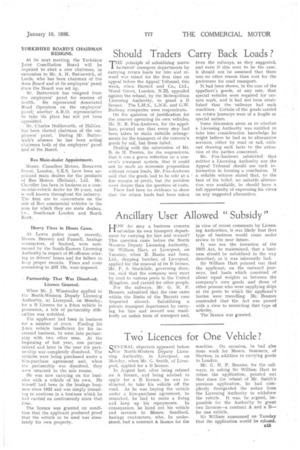Should Traders 'Carry Back Loads ?
Page 33

If you've noticed an error in this article please click here to report it so we can fix it.
THE principle of subsidizing manu facturers' transport departments by carrying return loads for hire and reward was raised for the first time on appeal before the Appeal Tribunal, this week, when Barrett and Co., Ltd., Wood Green, London, N.22, appealed against the refusal, by the Metropolitan Licensing Authority, to grant a B licence. The L.M.S., L.N.E. and G.W. Railway companies were respondents. • On the question of justification for the concern operating its own vehicles, Mr. N. R. Fox-Andrews, for the appellant, pointed out that every step had been taken to make suitable .arrangements for the transport of the concern's goods by rail, but these failed.
Dealing with the submission of Mr. B. de H. Pereira, for the respondents, that it was a grave reflection on a concern's transport system, that it could not be made an economic proposition without return loads, Mr. Fox-Andrews said that the goods had to be sold at a fine margin of profit, but the problem went deeper than the question of costs.
There had been no evidence to show that the return loads had been taken from the railways, as they suggested, and even if this were to be the case, it should not be assumed that there was no other reason than cost for the preference for road transport.
it had been shown, in the case of the appellant's goods, at any rate, that special vehicles were required for certain work; and it had not been established that the "railways had such machines. Certain of the goods carried on retUrn journeys were of a fragile or special nature.
Some discussion arose as to whether a Licensing Authority was entitled to take into consideration knowledge he might believe he had as to alternative services, either by road or rail, without drawing such facts to the attention of the parties concerned.
Mr. Fox-Andrea's submitted that neither a Licensing Authority nor the Appeal Tribunal should use such information in forming a conclusion. If a reliable witness stated that, to the best of his belief, no suitable alternative was available, he should have a full opportunity of expressing his views on any suggested alternative.




































































































